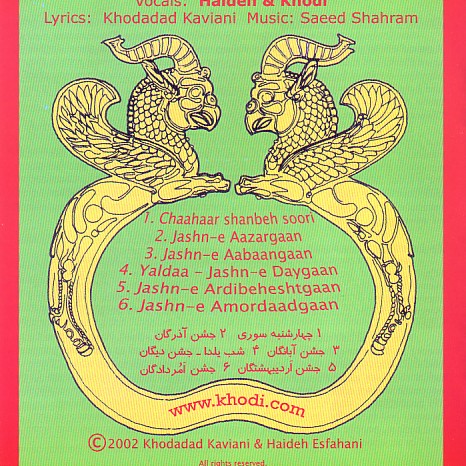|
Khodadad (Khodi) Kaviani and Haideh Esfahani have produced a unique cultural CD, called Amordaad, Songs of Persia II. This CD features six songs about the Zoroastrian and Iranian traditions and comes with a 16-page booklet that explains each of the highlighted festivities. This is a sequel to Khodi's first CD, Ancient Whispers, Songs of Persia I. Chaahaar shanbeh soori is the name of the first song on this album and it captures the essence of this poplular Iranian tradition. The form and content of this celebration has changed over many centuries and the lyrics reflect it well. It used to be a special time of the year before the arrival of the New Year that the spirits of our ancestors were honored and people would clean their homes and keep a fire burning in the honor of their arrival. Now days, young and old would jump over fire and sing. Later, children would go door to door, trick or treating. Chaahaar shanbeh soori is similar to a combination of the 4th of July and Halloween celebrations with a special Persian cultural twist. In the Zoroastrian calendar, we have at least one major festivity per month and this is due to the fact that each day had a name and each month had a name. When the names of the month and day coincided, a special celebration was arranged and people gave thanks to Ahuraa Mazdaa (God). These names reflect the many attributes of God as well as the guardians of nature and life. All of these combined, make life possible on earth and help us live a progressive and civilized life. The next two songs are about special celebrations that remind us to protect the fire (Aazar) and Water (Aabaan) from pollution and realize the usefulness of these life-supporting elements. Yaldaa (birth), the fourth song, is about the longest night of the year and the birth of our sun. It coincides with the start of the winter season. Yaldaa is celebrated in many parts of the world and the date of Christ's birth is believed to be the same night as well. Families and friends would gather, read poetry, have a feast and eat watermelon and other seasonal fruits and dried nuts. The fifth song is Ardibeheshtgaan, meaning "the best truth and piety." It is in late April and by then, all flowers are in full bloom and the world is paradise-like. This particular guardian fights depression and sadness. It brings light, happiness, and joy to hearts. The last song is titled, Amordaad, and it's about immortality of God and liberty and justice for humankind. These six festivals remind us of the richness of traditions that existed along the Silk Road civilizations and continue to be practiced by Zoroastrians as well as other people in the Middle East. They remind us of the simplicity of life tha we often times take for granted and the values of bringing communities together for the purpose of improving people's lives and helping each other. A small step has been taken here in building a bridge of understanding between cultures and civilizations. We have a lot more in common than we realize and hopefully, through this work, we are better able to see one world, and one human race, working for peace and the common good of all. Khodi Kaviani (www.khodi.com) is an educator, author, lyrist, singer, and cultural diversity trainer. Haideh Esfahani is a senior lecturer at the University of Washington. Saeed Shahram is an accomplished musician who composed the beautiful music of this album.
|
